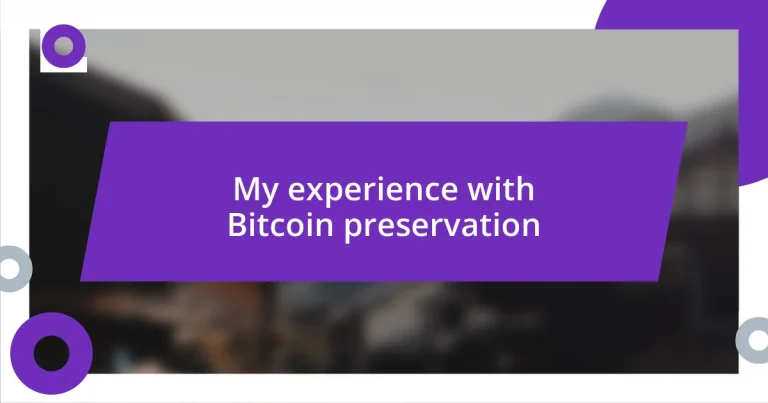Key takeaways:
- Utilizing hardware wallets, secure backups, and cold storage are essential techniques for safeguarding Bitcoin against hacking and loss.
- Implementing strong passwords and two-factor authentication significantly enhances the security of Bitcoin investments, alongside continuous education on potential threats.
- Emerging trends such as multi-signature wallets, decentralized storage solutions, and biometric authentication are poised to improve Bitcoin preservation strategies in the future.
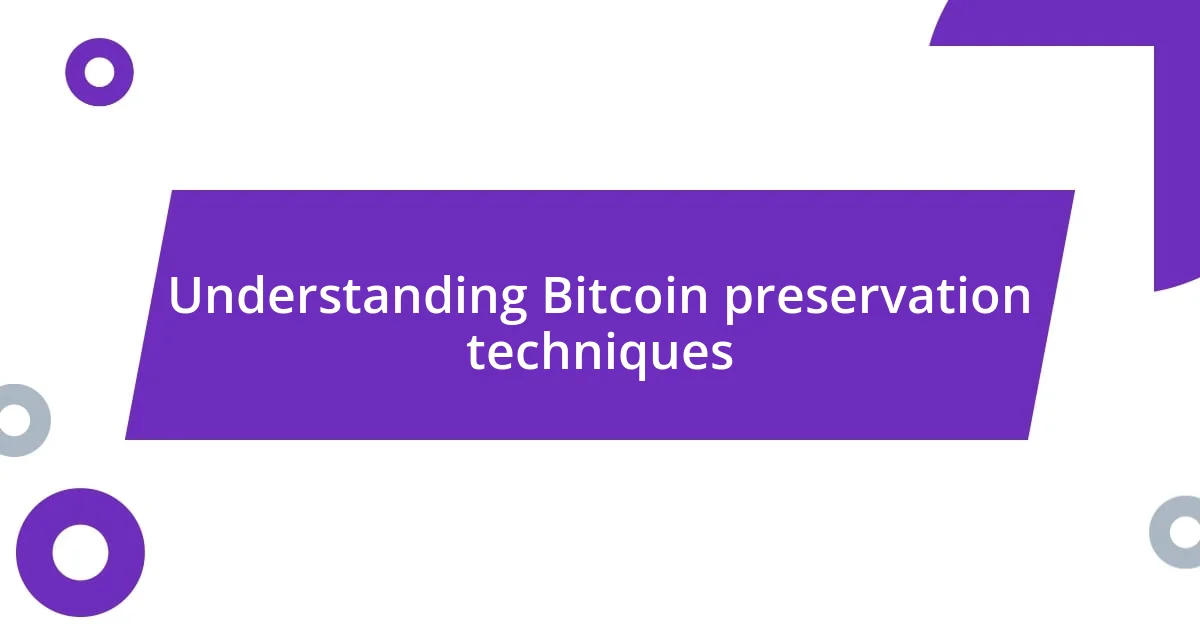
Understanding Bitcoin preservation techniques
When it comes to Bitcoin preservation, one fundamental technique revolves around using hardware wallets. I remember the first time I transferred my Bitcoin to a Trezor; it almost felt like sending my savings into an impregnable fort. Have you ever wondered how secure your digital assets really are? With a hardware wallet, you can significantly reduce risks like hacking, since these devices store your private keys offline.
Another method I’ve found invaluable is creating secure backups of my wallet. After an unfortunate incident where I lost access to my original wallet, I learned the hard way how crucial it is to maintain multiple copies of my recovery phrases. It made me think—what would I do if my only backup somehow vanished? Having these phrases stored in various secure locations not only gives me peace of mind but also safeguards my investment against unforeseen circumstances.
Finally, employing techniques like cold storage has been a game changer for me. I recall the sense of relief when I moved most of my Bitcoin to a cold wallet, detached from the internet. This practice made me question how many of us truly consider security versus convenience. It’s remarkable how such a simple step can elevate your security to another level—making an asset like Bitcoin feel not just secure, but truly preserved for the long haul.
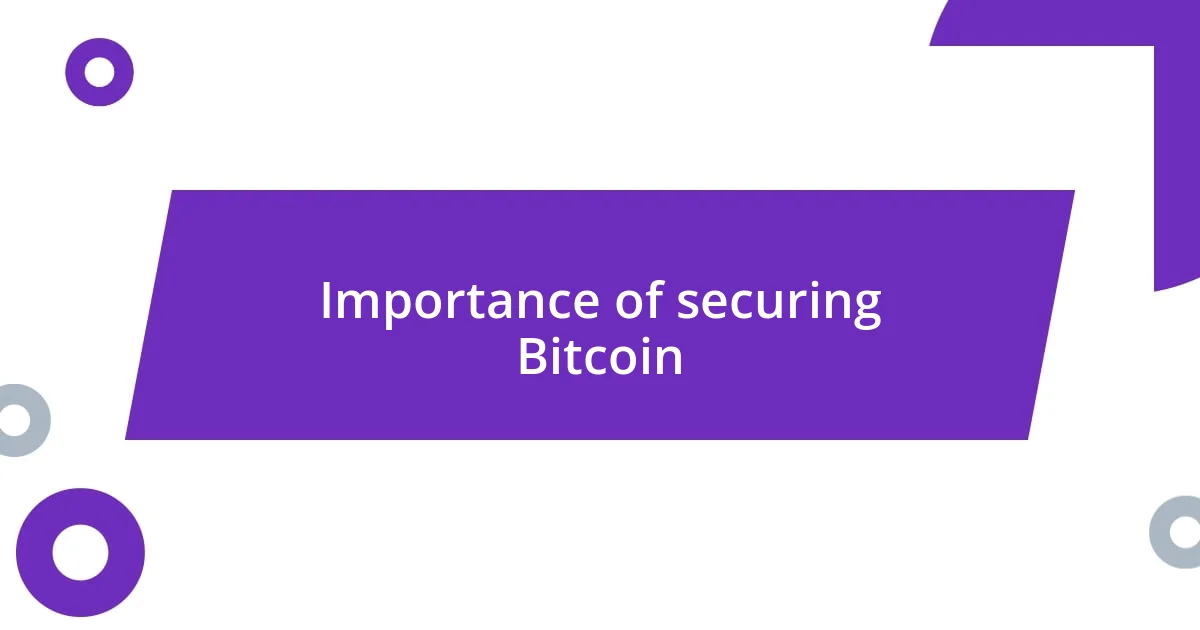
Importance of securing Bitcoin
Securing Bitcoin is paramount because the stakes are incredibly high. I recall a friend of mine who didn’t prioritize this aspect and ended up losing a substantial amount of his investment due to a phishing scam. This experience really hit home for me; it reinforced the reality that without proper security measures, anyone’s assets could vanish in an instant. How often do we think about the measures we take to protect our traditional assets? In my view, Bitcoin deserves the same level of caution.
Moreover, implementing strong passwords for wallets and enabling two-factor authentication can be game-changers. I remember feeling a surge of confidence when I set these measures in place for my own accounts. It was like adding layers of protection to my digital vault. Isn’t it fascinating to think how a few extra steps can transform your sense of security? It’s not just about having Bitcoin; it’s about ensuring it’s there when you need it.
Lastly, the importance of education in securing Bitcoin can’t be overstated. Early in my journey, I attended webinars and read countless articles about potential threats and best practices. That knowledge gave me a sense of empowerment. I often reflect on how investing time in learning about security can not only prevent losses but also foster a deeper appreciation for this revolutionary asset.
| Key Security Aspect | Importance |
|---|---|
| Hardware Wallets | Store private keys offline, reducing hacking risks |
| Secure Backups | Protect against loss of access and unforeseen circumstances |
| Cold Storage | Keep assets disconnected from the internet for maximum security |
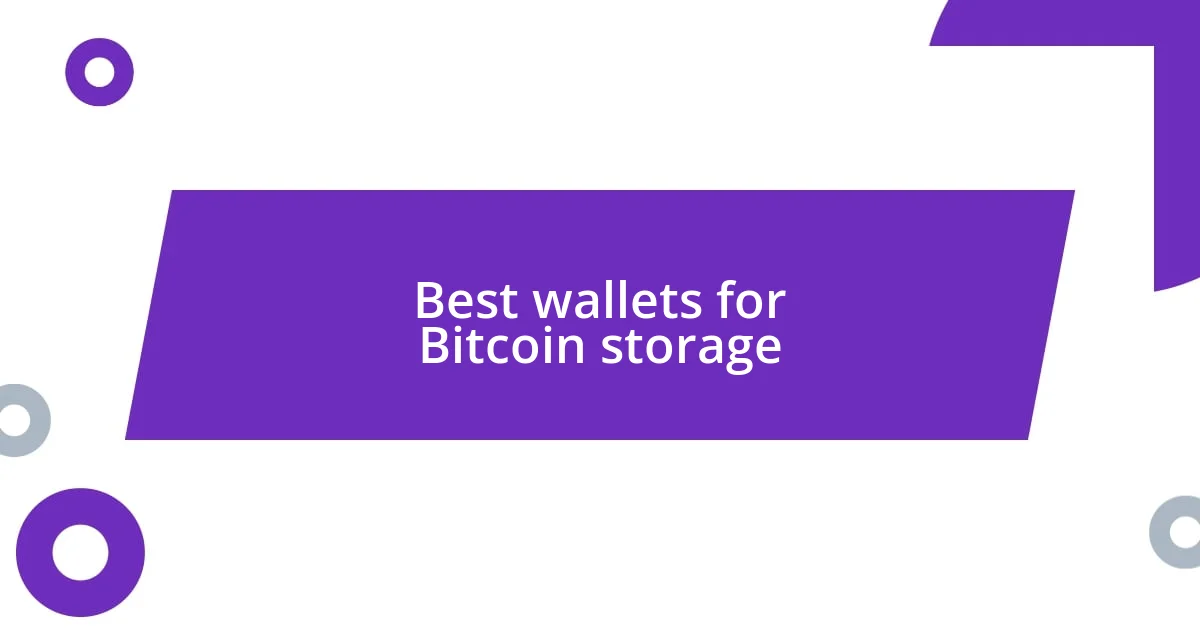
Best wallets for Bitcoin storage
One of the best wallets for Bitcoin storage that I swear by is a hardware wallet, specifically the Ledger Nano S. After making the switch, I felt an instant sense of relief, knowing my private keys were secured in a physical device rather than on my computer. The feeling of holding that small gadget was like having a safety deposit box right in my pocket—nothing beats that peace of mind.
Here are some of the top options to consider for your Bitcoin storage:
- Ledger Nano X: Offers Bluetooth connectivity and a user-friendly interface for easy management on the go.
- Trezor Model T: Known for its robust security features and intuitive touchscreen design.
- KeepKey: A sleek option that combines good security features with a straightforward setup process.
These wallets not only provide excellent security but also come with user-friendly applications that make tracking your investments simple. I remember when I first started using the Ledger wallet; it felt like I had taken a major step in taking responsibility for my financial future. It’s this blend of security and usability that makes these wallets a top choice in the Bitcoin community.

Strategies for storing private keys
When it comes to storing private keys, I’ve found that using a hardware wallet is truly a game changer. I remember the first time I plugged in my Ledger device; it felt like I was fortifying my digital treasure chest. The idea of keeping my keys offline brought me an immense sense of security, knowing they were out of reach from hackers. Isn’t it reassuring to think that such a small gadget can provide that level of defense?
Another approach I swear by is creating secure backups of my private keys. A couple of years ago, I learned the hard way when a computer crash nearly left me locked out of my own crypto. After that experience, I made it a priority to write down my keys and store them in a safe place. It’s a small task that could save you from a potential nightmare—who wouldn’t want that peace of mind?
Cold storage, my personal favorite, is such a fortuitous strategy for safeguarding Bitcoin. By keeping my assets disconnected from the internet, I feel like I’ve built an impenetrable fortress around my investments. Have you ever thought about how much risk is minimized just by not exposing your keys online? I vividly remember the day I moved my Bitcoin to cold storage; it was like taking a deep breath after holding my breath for too long. That feeling is priceless.
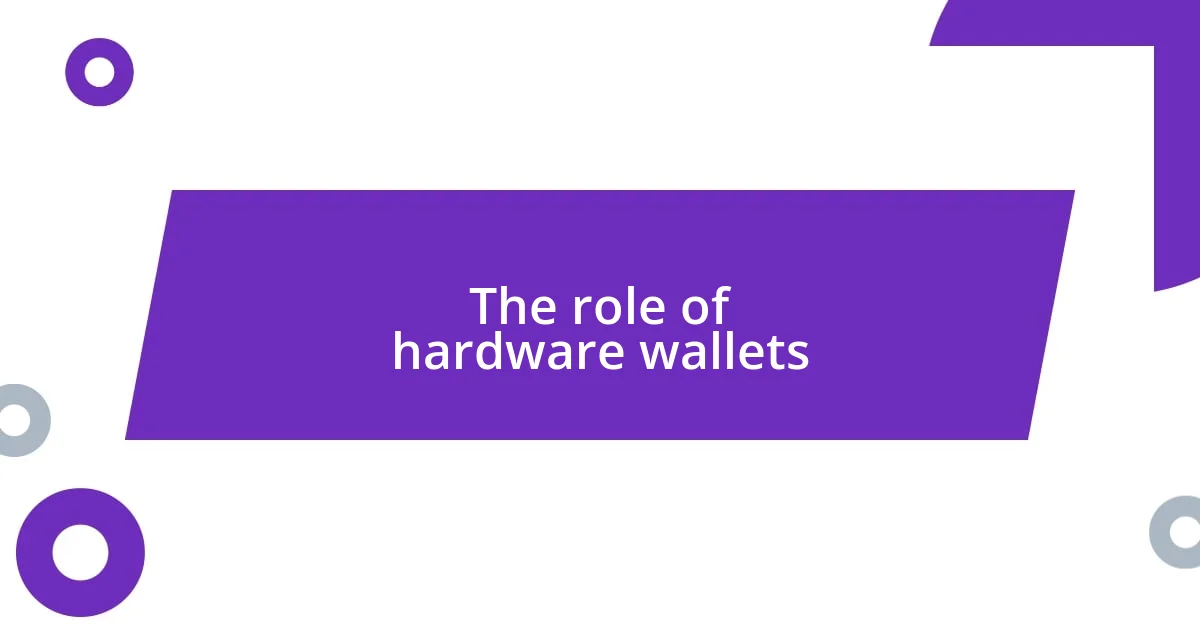
The role of hardware wallets
The role of hardware wallets in Bitcoin preservation is critical for anyone serious about security. I still recall the first time I withdrew my Bitcoin to a hardware wallet; it felt like sealing my valuables in a bank vault. The moment I unplugged my Ledger device after a transaction, I had a newfound confidence that my assets were safe from the pervasive threats of the digital world. What could be more reassuring than knowing your private keys are safeguarded in a physical device designed solely for that purpose?
Using a hardware wallet brings the concept of ‘cold storage’ to life. I remember watching a video where a cybersecurity expert explained how hardware wallets keep my private keys offline, far from the reach of hackers. This notion hit home for me because, in the past, I had my fair share of anxiety about online threats. With my Ledger, every transaction feels deliberate and controlled, rather than chaotic and exposed. Can you imagine the sinking feeling of losing access to your own funds? That’s why I appreciate the simple yet profound security these devices provide.
Moreover, hardware wallets often incorporate additional security layers such as PIN codes and recovery phrases. When I set up my Ledger for the first time, I realized it was more than just a wallet; it was a sophisticated tool for self-preservation. I felt like a digital guardian of my assets. I often wonder how many people are still unprotected, relying solely on online wallets without this kind of security. For me, investing in a hardware wallet wasn’t just a purchase—it was a strategic decision that changed the way I think about Bitcoin preservation.
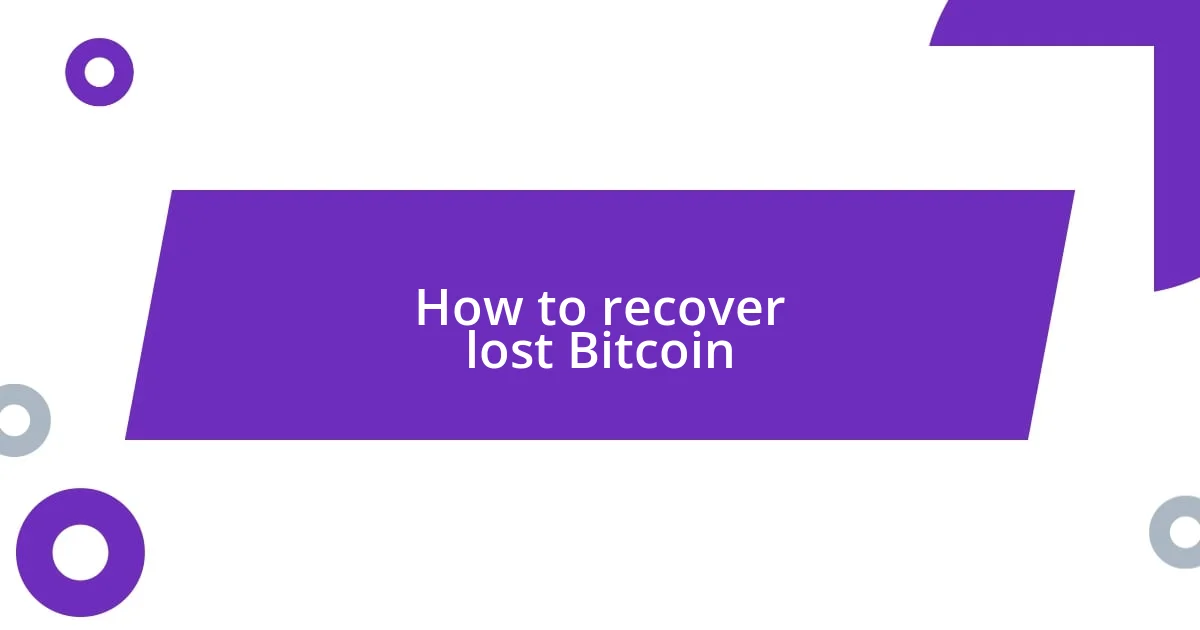
How to recover lost Bitcoin
The first step in recovering lost Bitcoin often starts with searching for your recovery phrase or seed. I can’t stress how crucial that phrase is—it’s your golden ticket to access. I remember the panic of misplacing my recovery words; it felt like losing the key to a treasure chest I’d labored to fill. Have you ever felt that gut-wrenching moment when you think everything is slipping away? Trust me, retracing your steps can lead to unexpected discoveries.
If your Bitcoin is stored on a wallet where you forgot the password, using recovery tools can be a viable option. I once found myself locked out of my wallet and turned to specialized software designed to recover access. The tension was palpable as I watched the progress bar. I was anxious, but there is something empowering about overcoming these hurdles, even if it requires a little technological finesse.
In case your Bitcoin is held on an exchange, contacting their support team can aid in the recovery process. I vividly recall the day I had to reach out for help. The representative was understanding and patient, which soothed my anxiety immensely. It made me consider how important it is to keep records of my transactions and communicate effectively. Have you considered what you would do if faced with a similar experience?

Future trends in Bitcoin preservation
As I look ahead, I believe a significant trend in Bitcoin preservation is the growing adoption of multi-signature wallets. This approach requires multiple private keys to authorize a transaction, adding a robust layer of security. I remember the relief I felt when I set up my own multi-signature wallet; knowing that my funds couldn’t be accessed without my partner’s approval brought a sense of safety that I had seldom experienced in the digital realm. Isn’t it comforting to think that even if one key is compromised, my assets remain protected?
Another trend I see is the rise of decentralized storage solutions. Using distributed networks to safeguard wallet data is intriguing to me. I recently experimented with a cloud storage option that segments my wallet keys across several locations. This method reinforced for me the importance of diversifying my risk in the digital space. Have you ever thought about how a single point of failure could threaten your entire asset base? Embracing decentralized storage might just be the answer.
Lastly, the development of hardware wallets with biometric authentication could redefine security measures in Bitcoin preservation. Imagine unlocking your wallet with a fingerprint—it’s futuristic yet feels so secure. When I first learned about this technology, I was immediately hooked; it’s like combining the best of both worlds: convenience and security. What if future wallets could not only verify our identity but also adapt to emerging security threats automatically? I can’t help but wonder how these innovations will shape our interactions with digital assets moving forward.












